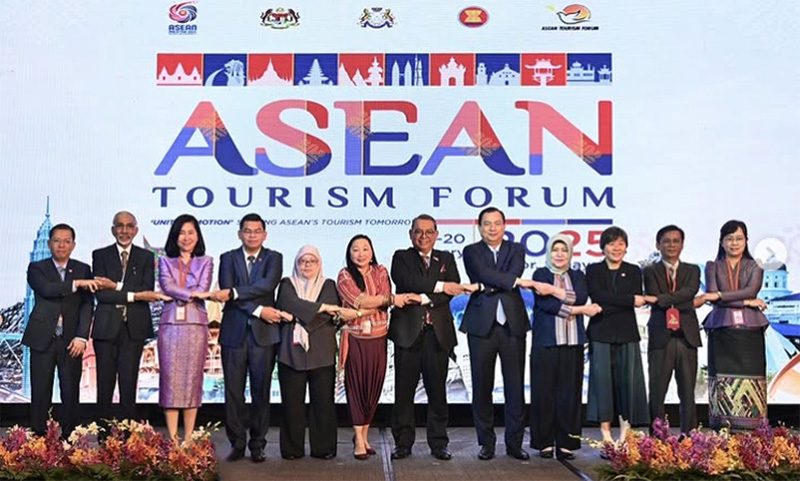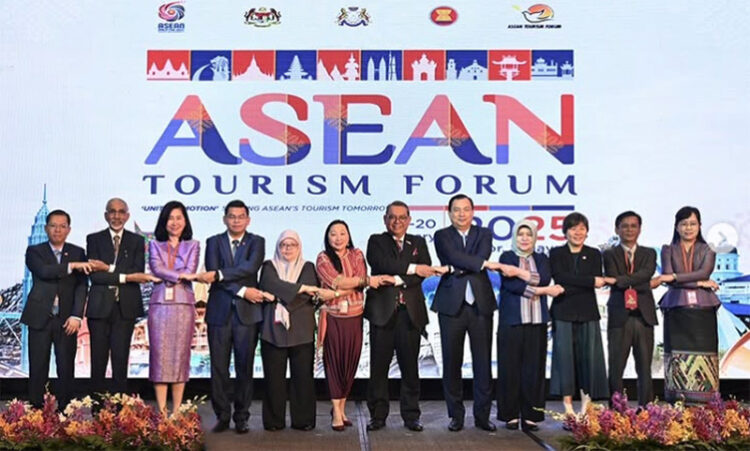ATF 2025 – Shaping the Future of Sustainable Travel and Regional Collaboration

 Johor Bahru, Malaysia, January 18, 2025 / TRAVELINDEX / The ASEAN Tourism Forum (ATF) 2025, held in Johor Bahru, Malaysia, marked a significant moment for the region’s tourism industry, offering a comprehensive platform for tourism professionals and stakeholders to converge, share insights, and explore new opportunities. As one of the most important events in Southeast Asia’s tourism calendar, the ATF 2025, along with the TRAVEX (Trade, Tourism, and Travel Expo), served as a dynamic marketplace for showcasing the diverse tourism products and services that the ASEAN region has to offer.
Johor Bahru, Malaysia, January 18, 2025 / TRAVELINDEX / The ASEAN Tourism Forum (ATF) 2025, held in Johor Bahru, Malaysia, marked a significant moment for the region’s tourism industry, offering a comprehensive platform for tourism professionals and stakeholders to converge, share insights, and explore new opportunities. As one of the most important events in Southeast Asia’s tourism calendar, the ATF 2025, along with the TRAVEX (Trade, Tourism, and Travel Expo), served as a dynamic marketplace for showcasing the diverse tourism products and services that the ASEAN region has to offer.
One of the central themes of the ATF 2025 was the discussion around the evolving nature of the “ASEAN Traveller of the Future.” According to experts, this new generation of travelers is increasingly driven by sustainable and experiential travel preferences. The emerging trends suggest a shift away from traditional mass tourism toward more personalized and eco-conscious experiences. Modern travelers are seeking authentic, immersive activities in off-the-beaten-path destinations that allow them to connect with local cultures, nature, and communities, while also minimizing their environmental impact. This shift in consumer behavior presents both challenges and opportunities for tourism stakeholders across the region as they work to balance growth with sustainability.
The forum also provided an opportunity to discuss the recovery and resilience of ASEAN’s tourism sector in the wake of the COVID-19 pandemic. As the region slowly emerges from the pandemic, the ATF 2025 highlighted the importance of collaboration among ASEAN member states to ensure the sustainable recovery of the tourism industry. Malaysia, as the host country for this edition of the forum, used the event to showcase Johor Bahru and other Malaysian destinations as rising stars in the region’s tourism landscape. The city, with its strategic location and vibrant cultural offerings, has quickly become an attractive destination for both regional and international travelers.
Sustainability and responsible tourism were key pillars of conversation throughout the forum. Participants emphasized the importance of addressing the challenges posed by overtourism and exploring ways to ensure sustainable development in the sector. There was a strong call for tourism businesses and governments alike to prioritize environmental conservation, community engagement, and cultural preservation as part of their growth strategies. Additionally, the event featured discussions around the role of digital technologies in promoting sustainability. Innovations in smart tourism, digital marketing, and data analytics were highlighted as tools to help optimize visitor management and create more sustainable travel experiences.
TRAVEX, which forms the business-to-business (B2B) component of the ATF, provided a vibrant networking environment for over 1,000 buyers and sellers from around the world. This trade expo was a vital hub for tourism professionals, offering a space for forging new partnerships, exploring new products, and expanding business opportunities across the ASEAN region. With representatives from destinations, hotels, airlines, and other travel service providers, TRAVEX played a crucial role in strengthening the commercial side of regional tourism and fostering collaboration between the public and private sectors.
One of the key takeaways from the ATF 2025 was the importance of digital transformation in the tourism sector. Sessions throughout the forum explored how technology can help enhance the overall tourist experience, improve destination marketing, and streamline the booking process. The rise of online platforms, mobile applications, and the growing role of artificial intelligence and machine learning were discussed in depth as important tools for boosting ASEAN’s competitiveness in the global tourism market.
The ATF 2025 also emphasized the need for ASEAN tourism to adapt to changing consumer expectations. With travel behavior becoming increasingly influenced by global trends, such as remote work, wellness tourism, and multi-destination trips, there is a clear need for the region to cater to these emerging demands. The forum provided a platform for participants to explore how the region’s destinations can remain attractive and competitive by diversifying their offerings and embracing new market trends.
In conclusion, the ASEAN Tourism Forum 2025 was an important milestone for the region’s tourism industry, bringing together thought leaders, industry professionals, and policymakers to discuss the future of ASEAN tourism. The event underscored the need for cooperation across borders to foster sustainable growth, with an emphasis on smart tourism, responsible travel practices, and digital transformation. As the tourism industry in ASEAN continues to recover and evolve in the post-pandemic era, the ATF 2025 reaffirmed that collaboration, innovation, and sustainability are key to shaping a successful future for the region’s tourism sector. Through events like the ATF, ASEAN demonstrates its commitment to positioning itself as a leader in sustainable and innovative tourism, ensuring that it remains a top destination for travelers around the world.
